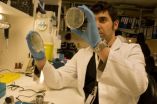(Press-News.org) One in three women around the world have experienced physical or sexual violence from a partner. Although domestic violence is associated with a range of adverse health impacts, even after the abuse has ended, it is not easily identified by health care professionals, prompting some countries, notably the United States, to introduce screening programmes in healthcare settings. A new study, published online by the BMJ today [13 May], has found no evidence to support domestic violence screening.
Researchers from the Universities of Bristol and Melbourne, La Trobe and Columbia Universities and Queen Mary University in London reviewed all trials globally that assessed the effectiveness of intimate partner violence screening in primary care, antenatal care and emergency medicine departments.
They looked at 11 studies, involving 13,027 women in high-income countries. Although screening increased identification of cases by 133 per cent, the proportion of women identified was small – ranging from three per cent to 17 per cent. There was no evidence that screening increased referrals to domestic violence support services, nor reduced violence or improved quality of life and other outcomes for domestic violence survivors.
Screening involved a range of methods to identify whether women patients had experience of domestic abuse, including face-to-face questions and computer surveys carried out during routine or emergency appointments.
Professor Gene Feder, from the University of Bristol's School of Social and Community Medicine, said: "Domestic violence is a crime and breach of human rights with major public health and clinical impact. Screening women in healthcare settings is national policy in some countries.
"By looking at research trials carried out around the world, we found no evidence that screening improves access to specialist domestic violence support or leads to a reduction of violence. This is an example of research that tells us what not to do. Yes, doctors and nurses need to ask women patients about abuse, but not all women patients. We need to shift the research focus towards developing effective care for survivors of domestic violence after they have disclosed, however they are identified."
The findings support the NICE domestic violence guidelines and the World Health Organisation's (WHO) intimate partner violence guidelines, which do not recommend domestic violence screening. They do recommend training of clinicians and development of care pathways to specialist domestic violence services, currently suffering funding cuts.
INFORMATION:
Paper
'Screening women for intimate partner violence in healthcare settings: abridged Cochrane systematic review and meta-analysis' by Lorna J O'Doherty, Angela Taft, Kelsey Hegarty, Jean Ramsay, Leslie L Davidson and Gene Feder in the BMJ.
Screening is 'not effective' in the fight against domestic violence
2014-05-13
ELSE PRESS RELEASES FROM THIS DATE:
Surgery study shows worse health, more problems and higher costs among Medicaid patients
2014-05-13
ANN ARBOR, Mich. — Surgery patients covered by Medicaid come into their operations with worse health, do worse afterward, stay in the hospital longer and find themselves back in the hospital more often than those covered by private insurance, a new analysis by University of Michigan Medical School researchers finds.
In fact, people with Medicaid coverage were twice as likely as other patients to have certain health risk factors before they had surgery, the researchers report in JAMA Surgery. They also had many more emergency operations, experienced two-thirds more complications ...
New cancer immunotherapy aims powerful T cells against tumors
2014-05-13
Deadly skin cancers in mice shrank in response to a new treatment that may complement other "immunotherapies" developed recently to boost the body's own defenses against disease threats, according to a new study published by UC San Francisco researchers in the May 2014 edition of the Journal of Experimental Medicine.
Using a mouse version of a human drug that is popular for treating osteoporosis, the UCSF researchers discovered a way to manipulate the thymus, a gland situated at the base of the neck above the heart, to alter its activity so that some of the specialized ...
First year student publishes monsoon study
2014-05-13
A first year Environmental Science student at The University of Nottingham Malaysia Campus (UNMC) has had a literature review of the Southeast Asian monsoon published in the academic journal Geoscience Frontiers. Her research concluded that future climate warming could lead to a 15 day delay in the monsoon onset in Southeast Asia by the start of the next century.
Yen Yi Loo investigated how global and regional temperature and rainfall anomalies affect rainfall patterns and the South East Asian Monsoon. She also highlighted how increased rainfall intensity in the last ...
New agent may enhance effectiveness of radiotherapy
2014-05-13
Scientists from The University of Manchester – part of the Manchester Cancer Research Centre - have demonstrated the potential of a drug to improve the effectiveness of radiotherapy in stopping tumour growth.
There is increasing interest in using the body's own immune system to attack tumour cells – a strategy that can be very effective without the side effects associated with conventional chemotherapy.
Skin cancers have been successfully treated using a topical cream, imiquimod, which recruits immune cells through a molecule known as toll-like receptor 7 (TLR7), a ...
Arthroscopy of the knee joint for arthrosis: No benefit detectable
2014-05-13
The benefit of therapeutic arthroscopy with lavage and possible debridement for the treatment of arthrosis of the knee joint (gonarthrosis) is not proven. There was no hint, indication or proof of benefit of therapeutic arthroscopy in comparison with non-active comparator interventions, e.g. sham surgery, for any patient-relevant outcome. From the active comparator therapies, only the injection of glucocorticoids into the knee joint produced worse results than arthroscopy for the outcome "global assessment of the symptoms of gonarthrosis".
This was the result of the ...
Identified 2 new genes involved in the more aggressive prostate cancer
2014-05-13
A study by the Columbia University Nova York, in collaboration with the Catalan Institute of Oncology , Belvitge Biomedical Research Institute (ICO-IDIBELL) has identified two new genes that lead to more aggressive forms of prostate cancer. The work done by Alvaro Aytes under the direction of Cory Abate-Shen , director of the Herbert Irving Comprehensive Cancer Center of the Columbia University, has been published in the latest issue of Cancer Cell.
Prostate cancer
Prostate cancer is the most common in men in Europe( accounts for 20% of all male tumors). The incidence ...
A tale of survival
2014-05-13
Frankfurt am Main, Germany, May 12, 2014. Hydrogen sulphide (H2S) is a potent inhibitor of aerobic respiration. However populations of shortfin molly fish managed to colonise springs with high concentrations of dissolved hydrogen sulphide. In a new study researchers from LOEWE Biodiversity and Climate Research Centre (BiK-F) and the Goethe University Frankfurt present evidence of genetic changes minimizing the harmful effects of H2S which enable the fish to survive in this deleterious environment. The study provides insight into the molecular mechanisms of this key adaptation ...
Bird invaders 'moving in' to UK's nature reserves
2014-05-13
A new study by scientists at the University of York and the RSPB Centre for Conservation Science has demonstrated that nature reserves and other areas specially protected for wildlife, as well as being vital for native species, are very important for helping European birds to expand their ranges into Britain naturally. The catch is that protected areas are also at increasing risk of invasion by species that have been introduced from further afield.
The research, published in the journal Diversity and Distributions, explores how the UK's special places for nature have ...
Comet theory false; doesn't explain Ice Age cold snap, Clovis changes, animal extinction
2014-05-13
Controversy over what sparked the Younger Dryas, a brief return to near glacial conditions at the end of the Ice Age, includes a theory that it was caused by a comet hitting the Earth.
As proof, proponents point to sediments containing deposits they believe could result only from a cosmic impact.
Now a new study disproves that theory, said archaeologist David Meltzer, Southern Methodist University, Dallas. Meltzer is lead author on the study and an expert in the Clovis culture, the peoples who lived in North America at the end of the Ice Age.
Meltzer's research team ...
Chemists design molecules for controlling bacterial behavior
2014-05-13
Chemists in the College of Arts and Sciences have figured out how to control multiple bacterial behaviors—potentially good news for the treatment of infectious diseases and other bacteria-associated issues, without causing drug resistance.
Yan-Yeung Luk, associate professor of chemistry, has spearheaded the discovery, in conjunction with his research lab at Syracuse University and the Wang Lab at SUNY Upstate Medical University. Their findings are the subject of a forthcoming article in the journal ChemBioChem (John Wiley & Sons Inc.).
"Since the discovery of the first ...


